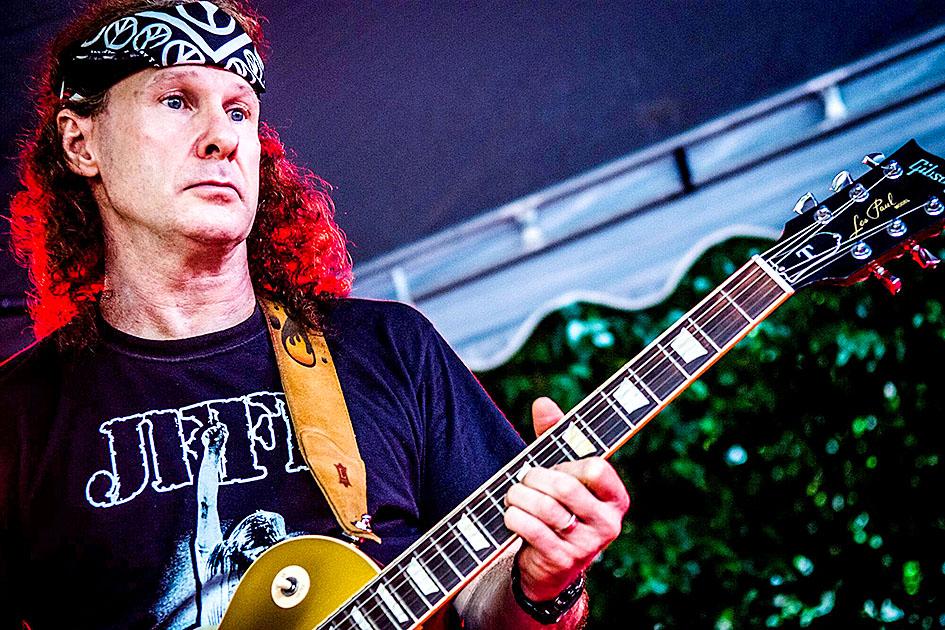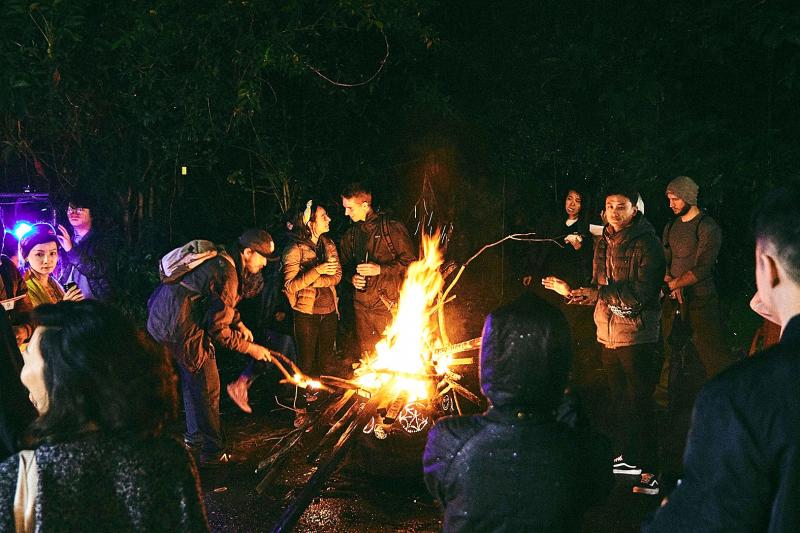It was a musician’s worst nightmare: Mike McLaughlin blew his rig hours before pop queen A-mei’s (張惠妹) took the stage in Hong Kong. Having only previously played in Taiwan and the US, he had no idea that the voltage standard was different.
“It was my first time ever playing with A-mei. I’m pretty psyched and I really wanted to do a good job,” the session guitarist says. “Then I plug the rack in and blow it up the day of the show. I was like, ‘Oh my god, what am I going to do?’”
Fortunately, only the fuse was damaged and it was quickly replaced. McLaughlin went on to tour with an impressive list of Taiwan’s pop royalty over the next two decades.

Photo courtesy of Tiger Mountain Ramble
The months leading up to Lunar New Year is usually busy season for McLaughlin. But due to COVID-19, there’s been few performances for him besides last month’s six-show concert in Kaohsiung with pop diva Jolin Tsai (蔡依林), which he says is the most elaborate production he has ever been part of. They kicked off the tour in Taipei in December last year and planned to head to China for over 40 shows, but that all fell apart as the virus hit.
The lull has given McLaughlin time to work on his rock and blues-oriented material and participate in local projects ranging from his one-man show to a “Taiwan G3” supergroup with fellow guitar virtuosos Fabio Moreira and Again (蔡科俊, concert director for Jay Chou, 周杰倫). While McLaughlin is no stranger to Taiwanese festivals, tomorrow’s Tiger Mountain Ramble will be his first time rocking out to his own songs with new outfit Soul Connection.
The band will be playing McLaughlin’s originals as well as some bluesy covers during the all-day jamboree, which features 16 bands and two DJs on three stages in a mountain venue just a short walk or 10-minute taxi ride from Xiangshan and Houshanpi MRT stations. The lineup ranges from rock to blues to gypsy jazz, Afro-Carribean beats and Latin grooves, and there will be a campfire and plenty of food and drink options.

Photo courtesy of Tiger Mountain Ramble
Decked out rocker style with a skull ring and multiple hoop earrings under a curly mane of hair, McLaughlin arrives at our interview this week looking like he’s ready to jump on stage and start shredding his heart out. The St Louis native has mainly been working with Taiwan’s household pop names since he relocated here in 2000, but his soul is still rooted in the ‘70s and ‘80s rock ‘n’ roll he grew up on. Antipop, the title of his first solo album, says it all.
The freedom that McLaughlin is allowed to express himself varies from artist to artist. Music director for Tsai’s concerts, Starr Chen (陳星翰), is among those who let him cut loose.
“He’s very open and he’s like, ‘Yeah man, Mike, make it rock.’ He gives me the freedom to add my own little sauce,” McLaughlin says. “Some people are like, ‘Stick to the program and what’s written on the chart,’ and you have to be flexible — especially if you’re a hired gun, so to speak. You have to give them what they want.”

Photo courtesy of Tiger Mountain Ramble
McLaughlin recalls the explosive vocalist Shin (信) pushing him when arranging some of his old tunes for a show, which seemed to alarm the record label executives a bit.
“He was really into [German metal band] Rammstein at that time and he was like, ‘Make me sound like that,’” McLaughlin quips.
Rock duo Power Station (動力火車) was also fun to work with because they still did everything live for their concerts instead of having everything charted out and controlled with in-ear monitors and click tracks.
“That was one of the closest things to a live rock ‘n’ roll band that I was used to in the early days,” McLaughlin says.
McLaughlin was already making his mark in Los Angeles during the 1990s — one of the highlights was touring with Kiss founding drummer Peter Criss — when he landed a gig to lay down some tracks for a Taiwanese singer. He knew nothing about Taiwan then, but he got on well with recording engineer Terrance Sheng (盛子貞), who invited him to collaborate on other projects.
Sheng was well-connected with Taiwan’s music industry as bass player for influential rock band Oriental Express (東方快車), and he headed home to promote a demo with a female singer he wrote and recorded with McLaughlin. One of the people who heard the tape was veteran entertainer Chyi Chin (齊秦), who enjoyed the production so much that he recruited Sheng and McLaughlin to work for him in Taiwan. One connection led to another, and soon McLaughlin was in demand by the nation’s top acts.
Despite his glitzy resume, McLaughlin still relishes the chance to play at more intimate venues such as last Friday’s performance at Craft House, a tiny beer and pizza joint in Taipei.
“Those are fun in a different way because I get the freedom to do whatever I want,” McLaughlin says. “I get to stretch things out and try new things. Both worlds are great and I enjoy them both and all the stuff in between.”
Just like the Tiger Mountain Ramble.

On April 26, The Lancet published a letter from two doctors at Taichung-based China Medical University Hospital (CMUH) warning that “Taiwan’s Health Care System is on the Brink of Collapse.” The authors said that “Years of policy inaction and mismanagement of resources have led to the National Health Insurance system operating under unsustainable conditions.” The pushback was immediate. Errors in the paper were quickly identified and publicized, to discredit the authors (the hospital apologized). CNA reported that CMUH said the letter described Taiwan in 2021 as having 62 nurses per 10,000 people, when the correct number was 78 nurses per 10,000

As we live longer, our risk of cognitive impairment is increasing. How can we delay the onset of symptoms? Do we have to give up every indulgence or can small changes make a difference? We asked neurologists for tips on how to keep our brains healthy for life. TAKE CARE OF YOUR HEALTH “All of the sensible things that apply to bodily health apply to brain health,” says Suzanne O’Sullivan, a consultant in neurology at the National Hospital for Neurology and Neurosurgery in London, and the author of The Age of Diagnosis. “When you’re 20, you can get away with absolute

May 5 to May 11 What started out as friction between Taiwanese students at Taichung First High School and a Japanese head cook escalated dramatically over the first two weeks of May 1927. It began on April 30 when the cook’s wife knew that lotus starch used in that night’s dinner had rat feces in it, but failed to inform staff until the meal was already prepared. The students believed that her silence was intentional, and filed a complaint. The school’s Japanese administrators sided with the cook’s family, dismissing the students as troublemakers and clamping down on their freedoms — with

As Donald Trump’s executive order in March led to the shuttering of Voice of America (VOA) — the global broadcaster whose roots date back to the fight against Nazi propaganda — he quickly attracted support from figures not used to aligning themselves with any US administration. Trump had ordered the US Agency for Global Media, the federal agency that funds VOA and other groups promoting independent journalism overseas, to be “eliminated to the maximum extent consistent with applicable law.” The decision suddenly halted programming in 49 languages to more than 425 million people. In Moscow, Margarita Simonyan, the hardline editor-in-chief of the